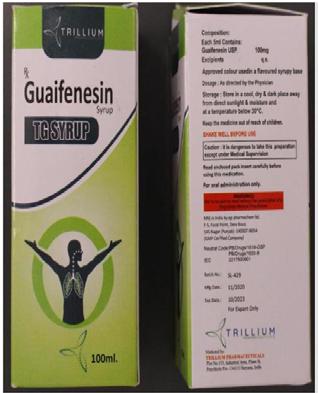
4 minute read
After WHO warning, FSM Health pulls potentially deadly cough medicine from FSM shelves
Four FSM citizens have currently reported adverse health effects—recall operation still in process
By Bill Jaynes The Kaselehlie Press
May 10, 2023
FSM—On May 3, 2023, the Pohnpei State Department Health Services issued an SMS medical alert by cell phone. It said medicine “TRILLIUM Guaifenesin Syrup, TG Syrup, 100 mg/5ml” dispensed by the Pohnpei State Hospital Pharmacy and Dispensaries between August 2022 and April 2023 was found to be contaminated. It warned people who had received the medicine to “disregard” it as soon as possible. An hour and a half later FSM Department of Health and Social Affairs issued a similar SMS message but with the more clearly worded warning that the medicine with batch number SL-429 should be “discarded” immediately, and with good reason.
According to Reuters, “the new (World Health Organization alert issued on April 26) follows three similar warnings issued last year by the WHO about contaminated cough syrups for children. These syrups, made by different manufacturers in India and Indonesia, have been linked to the deaths of more than 300 children – mainly aged under 5 – from acute kidney injury in Gambia, Indonesia, and Uzbekistan.”
For some unexplained reason, it took several days for the FSM to decide to publicly issue an alert about the medicine. “The substandard product referenced in this alert is unsafe, and its use, especially in children, may result in serious injury or death,” the WHO alert said. “Toxic effects can include abdominal pain, vomiting, diarrhea, inability to pass urine, headache, altered mental state and acute kidney injury which may lead to death.”

7500 bottles of the medicine, manufactured by India’s QP Pharmachem based in Punjab and marketed by Haryana, India-based Trillium Pharma, were received in the FSM in June of 2021. The medicine was provided by the World Bank to the FSM Department of Environment, Climate Change, and Emergency Management. The World Bank had told the FSM that its procurement procedures were weak and so insisted that the FSM utilize UNOPS (the United Nations Office for Project Services), which then facilitated the purchase from the company in India.
Several months ago, UNOPs facilitated another purchase of medical supplies. The FSM had to discard two pallets of lactated ringers, an intravenous solution that is used for aggressive fluid replacement in many clinical situations. The IV solution was contaminated.
Under a similar grant, the Republic of the Marshall Islands (RMI) received the same Guaifenesin cough medicine also facilitated by UNOPS procurement procedures. RMI initiated a request to the Australian Therapeutic Goods Administration (TGA) to investigate the drug. WHO also took its time in issuing a warning. On April 6 of this year, TGA submitted a report to WHO, and on April 26, the WHO issued the alert.
The investigation showed that samples from a batch of the cough syrup were contaminated with unacceptable amounts of diethylene glycol and ethylene glycol, which are toxic to humans when consumed and can prove fatal.
A spokesperson from the FSM Department of Health said that after receipt of the medicines, the 7500 bottles were distributed to the FSM State on a pro-rata basis to FSM Hospital Pharmacies. 3000 bottles were distributed to Chuuk, 2250 to Pohnpei, 1500 to Yap, and 750 to Kosrae.
Some illness has been reported in Chuuk and Yap. Yap reported that two of their patients had returned their cough syrup to the pharmacy, and both stopped the meds due to toxic effects such as vomiting, diarrhea, and feeling very sick. According to an adult patient in Yap, once he stopped using the medicine, he started to feel better. “As for the child, she is in the outer islands, and so we await further details on her health status,” the spokesperson said.
Chuuk had a similar report regarding two patients who had received the medicine.
Yap plans to contact the approximately 400 people who, according to their electronic prescription records, received the guaifenesin.
By April 28, 1106 bottles had been removed from the shelves of Yap pharmacies, 100 bottles from Kosrae, and one bottle from Chuuk. FSM DHS was unable to determine how much of the medicine Pohnpei had distributed.
Reuters reported that QP Pharmachem’s managing director Sudhir Pathak said that it had tested a sample from the exported batch following a query from the local state drug regulator. Pharmachem and the regulator found the batches to be satisfactory. The medicine is distributed in India as well, but the company has not received any complaints so far. Pathak told Reuters that it had permission from the Indian government to export 18,000 bottles of the syrup only to Cambodia. It is unclear how the product ended up in the Marshall Islands and Micronesia.







